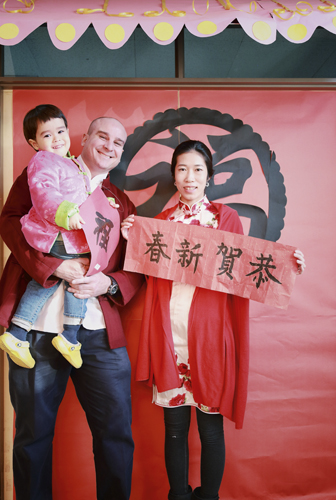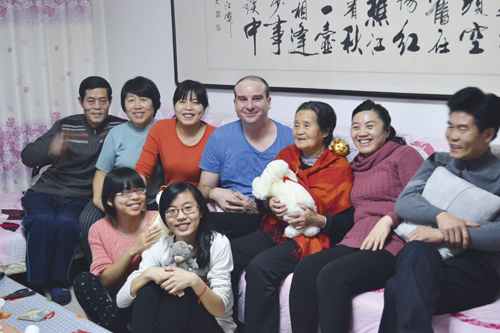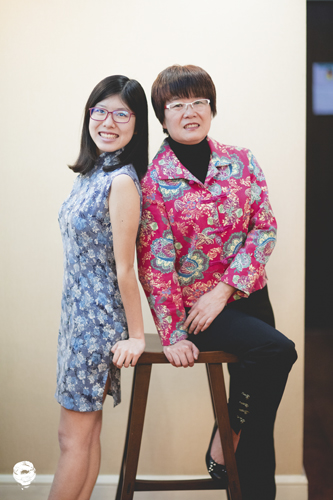新年快乐!: How Chinese Families Celebrate Chinese New Year
Spring Festival (Chunjie or 春节) kicks off the year of the Monkey, beginning with Chinese New Year on February 8, and ending 15 days later with Lantern Festival on February 22. As Christmas is very much about family for some westerners, so Chinese New Year is a time to gather together and share time with their families. With the Chinese diaspora as far-flung and extensive as it is, trains, planes, and automobiles will be packed with family members expressing their filial piety by returning to their hometowns. We look into the traditions of two Beijing families to find out more about the country’s most important holiday.

The Cao-Doherty Family
Australian Miles Doherty teaches at Beijing International Bilingual School (BIBA). His Chinese wife Ying Cao is a stay at home mother. Their son Patrick (age 2), was born in Beijing and attends ECC-2 at BIBA.
Plans
Every year we travel to Ying’s hometown outside Beijing. Ying comes from a large family – the 33 people that make up Ying’s side of our family gather at her 90-year-old Grandma’s country farm house. It’s a great opportunity for the family members that now work and live in different cities, to meet and catch up and enjoy discovering how each family member is doing. Chinese New Year is very important to our family. It’s not just a cultural tradition but also a family tradition that has been passed down for many, many years and one which we will continue to value.
Traditions
On the first day of Chinese New Year, we scrub up and get dressed in our finest clothes. The younger generations will have the first formal greeting with Ying’s Grandma and wish her a very happy New Year and wish for her to live a long and happy life with us. She will give red envelopes to the young kids and whoever has joined the workforce from the younger generations will give a red envelop to her. This part has been a tradition for our family over the last 30 years and when it’s time, the second generations like Ying’s parents or aunt and uncle will lead the third and fourth generation to Grandma’s room and tell them what to do.

Decorations
Normally people will have a big clean up of their houses, then when everyone is home, Ying, her uncle, her dad, and her cousin will be in charge of putting dui lian [decorative couplets written on strips of red paper] on the main gates, chuang hua [red paper-cuttings] on the windows, and big red lanterns on the main entrance. Then during New Year’s day, cookies, candies, fruits, and tea will be put on the table in the living room for the guests.
Food
Ying’s parents, Shu Shu (uncle), and Shen Shen (aunt) will cook dumplings and other dishes together while Ying’s grandma walks around supervising.
Patrick’s Favorite Part
He loves the fireworks and playing with his many family members – especially the younger ones and his great grandma. This year Patrick’s teachers have started to warm up for the Chinese New Year by telling stories about the big monster Nian, so we think that this will be the story we will tell this year.
How Spring Festival is Changing
It was a big festival for Ying when she was younger. Back then Chinese New Year meant winter holidays, new clothes, yummy food, lots of red envelopes ... it was like heaven. Chinese New Year has become less and less festival-like though. Many of Ying’s generation married after growing up. The tradition that the wife would spend Chinese New Year at the in-law’s place has meant that in Ying’s family which has a lot of women, the number of people that celebrate New Year together has been getting smaller and smaller. China has developed so much that Chinese New Year food’s are no longer as special and new clothes are available year-round. A lot of young people are choosing to travel during the long public holiday instead of visiting their families. Online greetings, online red envelopes, and phone calls have taken a far greater part in recent New Year celebrations.

The Yao Family
Yuanna Yao (age 18) attends Beijing City International School. Her mom Jing Zhang and dad Kun Yao were both born and raised in Beijing, and both are engineers.
Plans
Having parents who work in multi-national companies, I’ve celebrated Spring Festival in many different places over the years due to their overseas postings. For instance we celebrated spring festival in Cyprus when I was three. Since I started school, even though we came back to China, we still love to spend the festival in other places such as Shanghai, Anhui, Zhejiang, and Thailand. Spring Festival is one of the most important times of the year, because the whole family gathers together. Normally I live in Beijing with my mom, whereas my dad lives in Shanghai. Spring Festival is the time of year when we can be together with entire the family. I’ll study abroad later in the year so this year we plan to visit grandma and grandpa, and hang out with my cousins.
Traditions
Besides having dumplings on New Year ’s Eve, we also eat dumplings on the fifth day of the new year according to the lunar calendar. On the fifth day we intentionally overcook the dumplings so that they break to celebrate the first five days of New Year. I learned this tradition from my grandma. My grandma usually starts to prepare for Spring Festival in December [Lunar calendar]. She begins preparing many dishes which she finishes making on New Year ’s Eve, and then serves for dinner. After dinner, the whole family sits down to make dumplings. We eat them at midnight. After that, for the first fifteen days of the New Year we don’t cook as often so that there’s more time to enjoy ourselves and relax. One of our special traditions was passed on by my grandpa. He would put a coin in one of the dumplings and leave a special mark. Then he intentionally let one of the elders in the family have it, because whoever eats the dumpling with the coin has the best of luck in the following year. Now instead of coins we put other things in the filling such as sugar, orange, pepper, and more.
Decorations
The most visible decoration we put up is the Chinese character 福 (fu), which means luck. We put it on the door. Sometimes we also put up pictures of that year’s Chinese zodiac animal to celebrate the upcoming year.
Food
We usually have a fancy dinner which definitely includes dumplings. Fish is also a must. Interestingly we don’t finish the fish as part of the tradition年年有余, [nian nian you yu, may you have surplus year after year]. We also have braised pork which is my favorite. The adults drink Chinese baijiu and the kids have soft drinks like juice or soda. My grandma cooks the most. Sometimes my dad cooks too. He learned from a Sichuan cuisine chef when he was abroad.
Yuanna’s Favorite Part
I love watching the fireworks. Like every family, we tune into the Spring Festival Gala Evening, but when the show gets a little bit boring in the middle, we go out and light fireworks.
How Spring Festival is Changing
My parents were born in the 1960s when there was a lack of resources in the country. Spring Festival back then was simply the whole family having dumplings and playing poker after dinner. Back in the day, a set amount of the dinner on New Year’s Eve would be allocated to each family member, and no one could have more than what they were given. This was to ensure that my grandma would have enough to eat, because her three sons certainly ate a lot!
This article originally appeared in the February 2016 issue of our sister magazine beijingkids.
Photos courtesy of Miles Doherty, Henry Zhong, and Zeus







